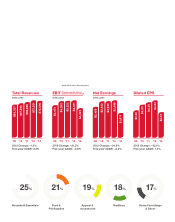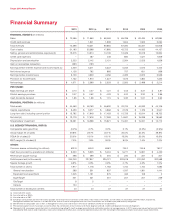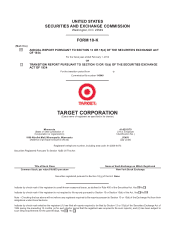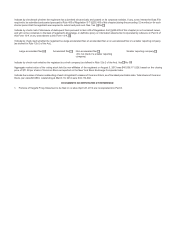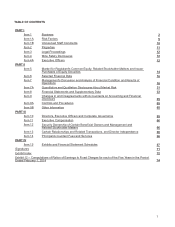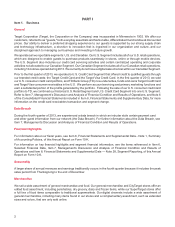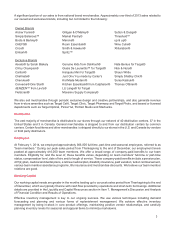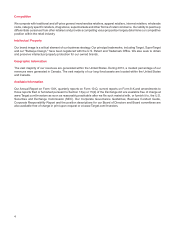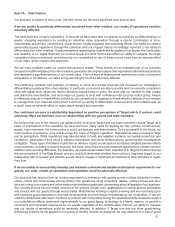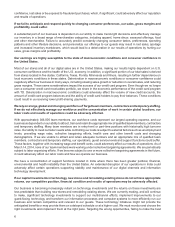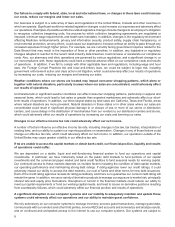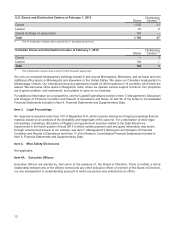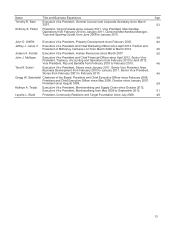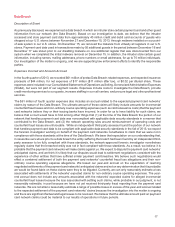Target 2013 Annual Report Download - page 12
Download and view the complete annual report
Please find page 12 of the 2013 Target annual report below. You can navigate through the pages in the report by either clicking on the pages listed below, or by using the keyword search tool below to find specific information within the annual report.7
investments, or making an investment commitment significantly above or below our needs could result in the loss of
our competitive position and adversely impact our financial condition or results of operations.
In addition, our growth also depends, in part, on our ability to build new stores and remodel existing stores in a manner
that achieves appropriate returns on our capital investment. We compete with other retailers and businesses for suitable
locations for our stores. Many of our expected new store sites are located in fully developed markets, which are
generally more time-consuming and expensive undertakings than expansion into undeveloped suburban and ex-urban
markets.
Interruptions in our supply chain or increased commodity prices and supply chain costs could adversely
affect our gross margins, expenses and results of operations.
We are dependent on our vendors to supply merchandise in a timely and efficient manner. If a vendor fails to deliver
on its commitments, whether due to financial difficulties or other reasons, we could experience merchandise out-of-
stocks that could lead to lost sales. In addition, a large portion of our merchandise is sourced, directly or indirectly,
from outside the United States, with China as our single largest source. Political or financial instability, trade restrictions,
the outbreak of pandemics, labor unrest, transport capacity and costs, port security, weather conditions, natural
disasters or other events that could slow port activities and affect foreign trade are beyond our control and could disrupt
our supply of merchandise and/or adversely affect our results of operations. In addition, changes in the costs of
procuring commodities used in our merchandise or the costs related to our supply chain, including vendor costs, labor,
fuel, tariffs, currency exchange rates and supply chain transparency initiatives, could have an adverse effect on gross
margins, expenses and results of operations.
Failure to address product safety concerns could adversely affect our sales and results of operations.
If our merchandise offerings, including food, drug and children’s products, do not meet applicable safety standards or
our guests’ expectations regarding safety, we could experience lost sales and increased costs and be exposed to legal
and reputational risk. All of our vendors must comply with applicable product safety laws, and we are dependent on
them to ensure that the products we buy comply with all safety standards. Events that give rise to actual, potential or
perceived product safety concerns, including food or drug contamination, could expose us to government enforcement
action or private litigation and result in costly product recalls and other liabilities. In addition, negative guest perceptions
regarding the safety of the products we sell could cause our guests to seek alternative sources for their needs, resulting
in lost sales. In those circumstances, it may be difficult and costly for us to regain the confidence of our guests.
The data breach we experienced in 2013 has resulted in government inquiries and private litigation, and if our
efforts to protect the security of information about our guests and team members are unsuccessful, future
issues may result in additional costly government enforcement actions and private litigation and our sales
and reputation could suffer.
The nature of our business involves the receipt and storage of information about our guests and team members. We
have a program in place to detect and respond to data security incidents. However, because the techniques used to
obtain unauthorized access, disable or degrade service, or sabotage systems change frequently and may be difficult
to detect for long periods of time, we may be unable to anticipate these techniques or implement adequate preventive
measures. In addition, hardware, software or applications we develop or procure from third parties may contain defects
in design or manufacture or other problems that could unexpectedly compromise information security. Unauthorized
parties may also attempt to gain access to our systems or facilities through fraud, trickery or other forms of deceiving
our team members, contractors and temporary staff. Until the fourth quarter of 2013, all incidents we experienced were
insignificant. The Data Breach we experienced was significant and went undetected for several weeks. We experienced
weaker than expected U.S. Segment sales immediately following the announcement of the Data Breach, and we are
currently facing more than 80 civil lawsuits filed on behalf of guests, payment card issuing banks and shareholders.
In addition, state and federal agencies, including State Attorneys General, the Federal Trade Commission and the
SEC, are investigating events related to the Data Breach, including how it occurred, its consequences and our
responses. Those claims and investigations may have an adverse effect on how we operate our business and our
results of operations.
If we experience additional significant data security breaches or fail to detect and appropriately respond to significant
data security breaches, we could be exposed to additional government enforcement actions and private litigation. In
addition, our guests could further lose confidence in our ability to protect their information, which could cause them to
discontinue using our REDcards or pharmacy services, or stop shopping with us altogether.


